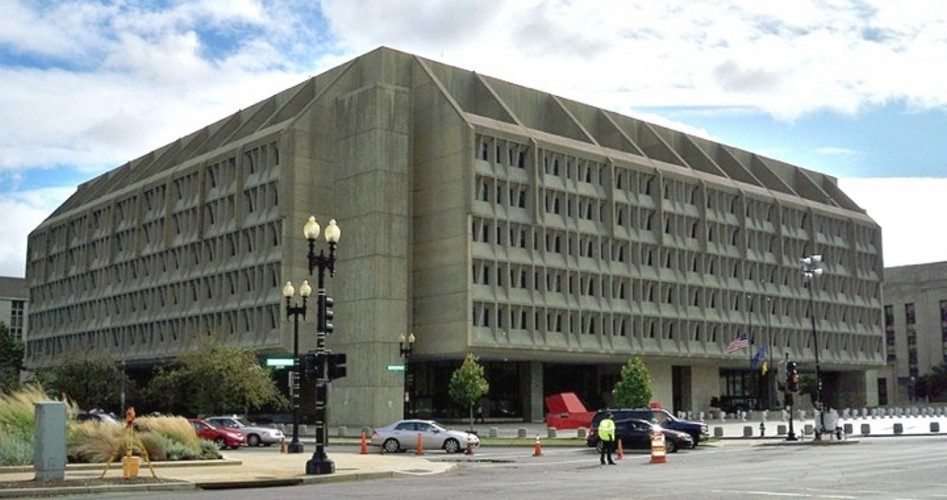
Earlier this month the Government Accountability Office (GAO) found that the Obama administration had violated the law by issuing waivers for welfare work requirements without first consulting Congress as required by the Congressional Review Act. Now Congress’ investigative agency reports that the Department of Health and Human Services’ (HHS) actions also contradict longstanding HHS policy stating that the department has no authority to issue such waivers.
The latest GAO report on the matter — issued in response to questions from Rep. Dave Camp (R-Mich.), chairman of the House Ways and Means Committee, and Sen. Orrin Hatch (R-Utah), ranking member of the Senate Finance Committee, both of whom had also requested the earlier report — finds that while the law permits HHS to waive the work requirements under certain circumstances, HHS has never granted any such waivers and has consistently held that it does not have the authority to grant them under any other circumstances.
Under the Temporary Assistance for Needy Families (TANF) program, created in 1996, the federal government provides block grants to states to supply cash payments and other benefits to families in need. “In order to be eligible to receive TANF funds,” wrote the GAO, “a state must submit to HHS a written plan outlining, among other things, how it will implement various aspects of its TANF program,” including “how the state will ensure that TANF recipients engage in work activities.” However, HHS has the authority to waive these requirements “in the case of experimental, pilot, or demonstration projects which the Secretary [of Health and Human Services] determines are likely to assist in promoting the objectives of TANF.”
On July 12 HHS issued an Information Memorandum stating that it would waive the requirements so that states could “test approaches and methods other than those set forth in” the law, “including definitions of work activities and the calculation of participation rates” in those activities, said the report.
“But states are already allowed to experiment now, as long as beneficiaries meet the work quotas defined by current law,” observed the Wall Street Journal. “The crucial change is that HHS is saying they can experiment instead of complying with the law.”
HHS suggests, for example, that states adopt “a comprehensive universal engagement system in lieu of certain participation rate requirements.” Universal engagement means that everybody is doing something constructive with their time “for at least one hour per week,” even if that’s as simple as “researching child care options” or “a job readiness workshop,” as a 2008 HHS document put it. So everybody can spend an hour looking into day care instead of — “in lieu of” — the work that 30% to 40% are supposed to be doing.
Seeing this as an attempt to perform an end run around Congress, Camp and Hatch asked the GAO to investigate whether HHS had ever before issued TANF waivers or had even claimed the authority to do so and whether any states had requested them. The GAO conducted a thorough review of HHS documents on the subject and even interviewed some HHS officials.
“Since the creation of TANF,” reported the GAO, “HHS has not granted any … waivers related to TANF.” In addition, the agency “did not find any evidence that HHS stated that it has the authority to issue waivers related to TANF work requirements, before the July 12, 2012, Information Memorandum.”
Between 2000 and 2009, only five states had even “expressed interest in TANF waivers,” the GAO noted, and then not to test other approaches but simply to be relieved of the requirements for other reasons. In every instance, HHS stated that “the requested waiver authority was not available.” In 2007 HHS provided general information to states regarding TANF waivers under disaster conditions. “In these documents, HHS stated that all applicable programmatic requirements apply to a family that is provided TANF-funded cash assistance, and the Department does not have authority to waive any of the provisions.” Moreover, while states asked Congress to provide increased waiver authority when TANF was reauthorized in 2005, “this waiver authority was not included in the [reauthorization] act.”
In short, in the 16 years since TANF was enacted, HHS has never before claimed authority to issue waivers of the kind it is now issuing, and on multiple occasions it has explicitly stated that it has no such authority. Congress did not grant the department this authority in the original law and declined to do so when the law was reauthorized. The Obama administration appears to have no legal basis whatsoever for granting these waivers.
“This Administration is unlawfully attempting to circumvent Congress to undo a successful law that they simply don’t like,” Camp said in a statement. “The Obama Administration,” he declared, “has simply gone too far.”
Hatch, likewise, condemned the administration’s “unprecedented power grab.” “That this Administration moved ahead [with the waivers] without consulting Congress demonstrates a complete disregard for the Constitution that explicitly gives the legislative branch the authority to make laws,” he said.
Congressional Republicans, joined by a few brave Democrats, are trying to overturn the HHS rule. Last week the House voted 250-164 to disapprove the rule; all Republicans plus 19 Democrats voted in favor of the resolution. Hatch has introduced a similar resolution in the Senate, but with Democrats in control of that chamber, it is unlikely to get very far.
Constitutionalists wish Hatch’s resolution well: The executive branch has no business changing duly passed laws. But if Republicans are going to expend so much effort, why not put it toward the genuinely constitutional end of repealing TANF altogether?
Photo: Department of Health and Human Services headquarters in Washington



